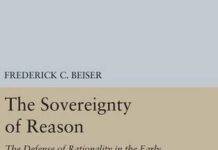
Ebook Info
- Published: 1993
- Number of pages: 410 pages
- Format: PDF
- File Size: 16.89 MB
- Authors: Frederick C. Beiser
Description
The Fate of Reason is the first general history devoted to the period between Kant and Fichte, one of the most revolutionary and fertile in modern philosophy. The philosophers of this time broke with the two central tenets of the modern Cartesian tradition: the authority of reason and the primacy of epistemology. They also witnessed the decline of the Aufklärung, the completion of Kant’s philosophy, and the beginnings of post-Kantian idealism.Thanks to Frederick C. Beiser we can newly appreciate the influence of Kant’s critics on the development of his philosophy. Beiser brings the controversies, and the personalities who engaged in them, to life and tells a story that has uncanny parallels with the debates of the present.
User’s Reviews
Editorial Reviews: Review “In undertaking this survey of the course pursued by German philosophy during the concluding decades of the eighteenth century, Frederick C. Beiser has produced a far-ranging and carefully documented contribution to the history of ideas… [A] scholarly, richly illustrated and well-integrated account of a fascinating moment in the history of thought.”―Patrick Gardiner, Times Literary Supplement“[The Fate of Reason] is a model of lucidity and ease of style, and these are traits which will certainly make it excellent reading for the general reader. But its freedom from pedantry only accentuates the formidably complete knowledge of the period on which it is based. The book offers a genuine contribution to the interpretation of the development of German Idealism, and for this it will also become an important source book for the specialist.”―George Di Giovanni, Journal of the History of Philosophy“[This book] will undoubtedly serve as an authoritative reference work in its field for many years to come and [it] deserves to be read by anyone interested in the history of German philosophy ‘after Kant’… There exists no better or more reliable guide to the ‘era’ in question than Beiser’s The Fate of Reason. Every student of post-Kantian German philosophy will want to own this book.”―Daniel Breazeale, The Owl of Minerva“[Beiser’s] analysis of the period is by far the most thorough to date, and it is certainly one that everyone seriously interested in the history of modern philosophy should read.”―Karl Ameriks, Philosophical Review“The story Beiser’s book tells is an absolutely crucial one for anyone who wants to understand Hegel. More than that, the epistemological and metaphilosophical crises it relates are of considerable general contemporary interest. It can and should be read with profit by philosophers with no antecedent interest in German philosophy of the time. I found it very exciting a―‘cracking good read’ of the sort one finds too seldom in intellectual history.”―Robert Brandom, University of Pittsburgh“This is a unique, original, and important work. It undertakes a project never before attempted in English, nor likely soon to be attempted again; nor is there, at least as far as I know, any comparable twentieth-century work in German. This is not, however, because everyone else has thought better of the idea; it can only be because anyone else who ever considered it has been daunted by the magnitude of the task involved. What Beiser has written is the history of German philosophy in the epoch of Kant, a history focused primarily on the issue of the authority of reason. There is a great unity to Beiser’s treatment: it presents a picture of a whole generation of philosophical activity in all its richness, greater fish as well as lesser ones included. [The account] is fascinating, because it has rarely been attempted at all and because this generation of German philosophy is the first such generation of professional, university-oriented philosophy in modern times. Thus, Beiser gives us a wonderful glimpse into the origin of our profession as such. The richness of the fabric, the detailed presentation of the views, makes [the movements treated] come alive.”―Paul Guyer, University of Pennsylvania“This treatment of a neglected chapter in the history of philosophy ranks in thoroughness with the best German sources and is philosophically acute enough to engage the English-speaking philosophical reader. The book is very well written and holds the reader’s interest extremely well. Beiser has a talent for seeing the lasting philosophical substance behind disputes couched in the language and problems of another age and culture. The mixture of well-handled philosophical substance and fascinating historical detail will make the book attractive to a wide variety of readers.”―Allen Wood From the Back Cover Thanks to Beiser we can newly appreciate the influence of Kant’s critics on the development of his thought. Beiser brings the controversies, and the personalities who engaged in them, to life and tells a story that has uncanny parallels with the debates of the present. About the Author Frederick C. Beiser is Professor of Philosophy at Syracuse University. Read more
Reviews from Amazon users which were colected at the time this book was published on the website:
⭐The first part of this review is devoted to reading this book in the Kindle edition. Anyone who wants wants to read the book review please skip the first part.Kindle edition-As you probably know, how well a book is adapted to the Kindle is up to the publisher. With scholarly books, this remains an annoying problem. It is much harder to use the bibliography and to read the footnotes in a Kindle. This is a Harvard book which means it is half-Kindlelized (sorry for the ugly word). I have a Kindle DX and the five-way button can be used to navigate from the footnote but not back again. There are other minor issues. In general, with a little knowledge of your Kindle, this is an okay way to read the book. I should mention that I have bought two other books by Beiser and chose the book version of the one other that had a Kindle edition. Maybe it is better with the Kindle Touch but for books that you want to study, not just read, the traditional book format is still the better way to go.Book Review-And this is a book you will want to study. It is a book I wish I had with me 35 years ago when I first read Kant’s first Critique. It would have made that an even more rewarding experience.I read Beiser as having one main theme that is explored by investigating two interrelated philosophical controversies. The main theme is the development of a crisis in the Enlightenment faith in the power of Reason. The challenge of Hume led to the sense the we faced an inescapable choice between skepticism and dogmatism/revelation (depending on whether we are talking rationalist philosophy or religion).The first controversy that Beiser explores is the debate over whether Gottfried Lessing was a crypto-Spinozist. This is the so-called Pantheism controversy that started with Jacobi’s relating conversations with Lessing in which Lessing confessed his Spinozism. This caused Mendelssohn to defend Lessing against the charge.Beiser is very good at drawing out the philosophical importance of this debate (see the appropriate section in Chapter 2- I refuse to acknowledge the existence of using the Kindle number system as a means of reference.) Jacobi was attacking the Enlightnment belief that it could serve philosophy and the public good at the same time. The Aufklärer (German Enlightenment philosophers)wanted to believe that they could educate the public away from the traditional dogmatism or faith based sources of morality. And that they could do so while relentlessly pursuing philosophical truth. Jacobi’s argument was that you could not do both. Philosophy was inevitably corrosive of the any source of morality. Surely the common folk would run amok. (Warren Montag’s Bodies, Masses, Power explores this theme as part of the reaction to Spinoza throughout this period).Jacobi revealed Lessing’s Spinozism because Lessing was the most famous of the Aufklärer and if he had fallen prey to the corrosive effect of philosophy then everyone would.Side note for the Straussians out there- I cannot help but note that one of Strauss’ first academic endeavors was to work on a edition of Mendelssohn’s writing and I believe that editing this portion of his writings had to be influential on his development.I see the second controversy that Beiser outlines to be how Kant’s contemporaries criticized his Critical philosophy and how Kant and/or his defenders answered those attacks. This is the part of the book that impresses me the most. Beiser’s grasp of not just the Critique but how Kant changed it over time is outstanding. Along with that he gives lucid expositions of Hamann, Herder, Eberhard, Feder, Reinhold, Schulz and Maimon. This is the part that would have made my life much easier the first time I went through the Critique. To read it isolated from the controversies of its development is to not see the reasons for some of the changes in the editions and for some of the equivocations in Kant’s technical language. Some of the critiques of his contemporaries are quite powerful. Not to mention that making the acquaintance of Soloman Maimon is alone worth the effort of reading Beiser. And, again, given the quality of his writing, that is not much effort at all.Who is this book for? Anyone who has ever braved a reading of the Critique of Pure Reason, anyone who wants to understand the historical development from Kant to Hegel, anyone who wants to appreciate the extraordinary impact of Hume and Spinoza on their contemporaries or anyone well versed in the history of philosophy who wants to read a paragon on how it should be done will want to read this book.
⭐One of the best books on philosophy ever
⭐Frederick Beiser is indisputably the best English historian of philosophy from the Kant to Hegel. This book is foundational for anyone interested in Kant, post-Kantian philosophy, and, more fundamentally, the modern world. It is well worth purchasing for at least three reasons.First, Beiser is an extraordinary writer, capable of taking the most arid subject matter and accurately contextualizing it and describing so as to make its significance not only obvious but riveting. There are chapters in this book, like the one on Maimon, which deal with abstruse and difficult criticisms of Kant, yet Beiser never takes his eye of the central theme of the book: reason, and its fate, and thus his writing never loses its clarity or his subject its interest. Beiser’s skill here is, as those who have studied his works know (I have read all of his books on German philosophy), in no small part a result of his historical method, which brings me to my second point.Beiser’s understanding of the history of philosophy is in the outstanding tradition of Dilthey, Haym, and others (who he mentions not infrequently in footnotes, prefaces, and introductions; perhaps the best overview of his historical method can be found in his responses to Terry Pinkard in the Hegel Bulletin) who take as a central task of the historian of philosophy the description of a thinker’s context in such a way that we, the readers, understand what it was that motivated the thinker and what he was trying to accomplish. In this case, we see the significance, the potency and danger, of Kant’s first Critique to his contemporary readers; we grasp what motivated such radically different critics as Jacobi or Hamann and Garve or Schulz to subject Kant’s Critique to a blistering array of criticisms. Contrary to the interpretations purveyed by rigorous but woefully unhistorical analytic philosophers like Strawson, Kant’s transcendental idealism was not an embarrassing blunder but an attempt to live in and reconcile the worlds of both Newton and the Enlightenment, of mechanistic nature and human autonomy. A nobler task could hardly be undertaken, for it manifested deep intellectual integrity and philosophical brilliance of world-historical force: reason hung in the balance, its fate subject to the success of Kant’s system.That is why, thirdly, this book is so important: the inherent interest, relevance, and power of its subject matter: the authority – and fate – of unaided human reason, a synecdoche of the Enlightenment project. For those who have never confronted head on the Enlightenment in its most intellectually powerful and rigorous representative – i.e. in Immanuel Kant – this book guides the careful reader to a historical precipice, from which they can, with Beiser’s aid, survey with clarity and profundity the depth of the challenge posed by Kant and the momentous significance of his success or failure. If reason alone is the arbiter before which all authority must submit, what happens when reason turns on it itself, subjects itself and its own authority to its own radical criticism? Rational criticism turned against reason is devastating in its skeptical, atheistic, and fatalistic consequences, as Jacobi and the Pantheism Controversy so clearly show, but can a leap of faith (Jacobi) or orthodox Christianity (Hamann) save us from a step back into blind bondage to tradition? Such are the issues of this book; such are the issues of the modern world. In light of that debacle called post-modernism, I think it is safe to say these issues are unresolved. As ever, history may show us the light, illuminating and granting, if not solutions, at least the ability to avoid past blunders and to see with clarity and depth the nature of our situation.Thus “The Fate of Reason” is no mere exercise in intellectual history or a survey of obscure thinkers; nor is it simply a primer on Enlightenment and its dangers, from within and without; it is a profound essay towards a more accurate understanding of ourselves and our world. Books of this nature and quality are rare and this makes “The Fate of Reason” all the more worthy of careful study and reflection.
⭐The cultural context in which Kant’s Critique of Pure Reason appeared was a complex and volatile mixture that responded to his work in a prolonged period of philosophical fireworks culminating in Hegel. This extremely interesting history of the first decade of reactions to Kant foretells in many ways the whole fate of modern philosophy, beginning with the first delayed review and then the attacks and challenges from Rheinhold to Jacobi and Maimon. One must wonder if this debate advanced beyond or frittered away the Kantian advance, as the outcome seems so very much to produce the reversal of original intent. Yet the issues raised by these critics are essential to consider, and often fail to appear in purely partisan accounts. The history stops before even Fichte and yet zooming in on this curious scene in detail brings alive the real issues that will echo all the way to Schopenhauer, and beyond.It is, presumably, a quibble to point out that the word ‘fate’ is severely cautioned at the begining of Kant’s deduction. One should wonder at its usage here. Perhaps this comedy of sudden philosophical raining cats and dogs ambushing Kant is a tragic fate in search of tragicomedy.
⭐After a colleague put me on to Professor Beiser’s excellent book, I read it, learned fom it, and enjoyed it–all within a month! I found it hard to put the book down–and I’m not even teaching in the modern philosophy area currently! I’ve now gone on to read his *Romantic Imperative* and I just started his book on Schiller.
Keywords
Free Download The Fate of Reason: German Philosophy from Kant to Fichte in PDF format
The Fate of Reason: German Philosophy from Kant to Fichte PDF Free Download
Download The Fate of Reason: German Philosophy from Kant to Fichte 1993 PDF Free
The Fate of Reason: German Philosophy from Kant to Fichte 1993 PDF Free Download
Download The Fate of Reason: German Philosophy from Kant to Fichte PDF
Free Download Ebook The Fate of Reason: German Philosophy from Kant to Fichte





